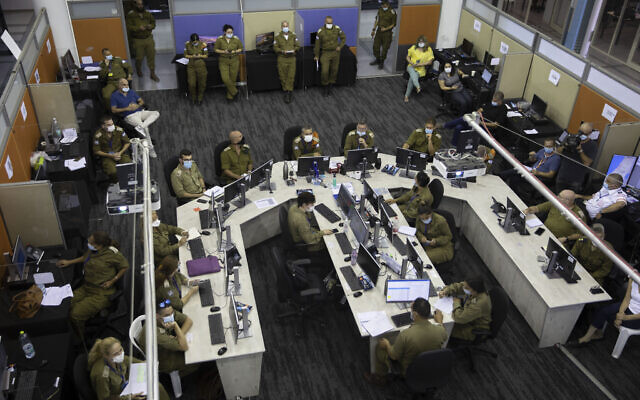Coronavirus czar Ronni Gamzu on Sunday told the Knesset that the military-run contact tracing system to cut chains of infection may not be fully operational until November 1.
“The task has been transferred to the IDF, and by November 1 there will be a full and functional system to cut the chain [of infection]. It is clear in this state of outbreak that the system is still not fully effective. It does exist, but there is still an increase in transmissions,” Gamzu said.
One of Gamzu’s first moves after his appointment was to give the Israel Defense Forces the job of cutting the chain of infections, with a task force formed under the Home Front Command last month to lead contact tracing efforts.
Most experts believe that effective contact tracing, combined with isolation of infected and exposed people, is key to stopping the spread of the coronavirus.
However, Gamzu warned that health officials were facing a worrying phenomenon of people not getting tested because they did not want to have to spend time in isolation.

Soldiers work in a situation room at the headquarters of the Home Front Command, in Ramle, August 25, 2020. (AP Photo/Sebastian Scheiner)
Facing an outcry from local officials in some of the eight to 10 localities expected to placed on lockdown from Monday morning due to high infection rates, Gamzu said that the sweeping regulations “should be viewed as help rather than a punishment.”
Gamzu directly addressed the mayor of the ultra-Orthodox city of Elad, Yisrael Porush, who attended the hearing ahead of the expected closure of his locality, and told him that although the municipality had done good work to try to reduce the spread of the virus, infection rates were still increasing.
“The closure decision is not easy for me, but you are currently not able to reduce the infection rate — there had been a decrease but there is currently an increase — and we need to help you now,” Gamzu said. “The problem of many ultra-Orthodox neighborhoods and cities is not behavior, but the infrastructure and overcrowding. This is not an expression of distrust in you or the residents. I was there — they really put on masks and are really disciplined.”

The entrance to the central Israeli city of Elad, June 24, 2020, during a full closure on the city (Flash90)
Ministers are expected to vote on Sunday in favor of a full closure of a number of areas, which according to Channel 12 news are expected to include Bnei Brak, Elad, Tira, Umm al-Fahm and Kafr Qassem.
The full list has not yet been confirmed. Channel 13 news reported that specific neighborhoods in Beit Shemesh could also be locked down.
The measures under discussion for locked down “red” cities include banning entry and exit, keeping residents within 500 meters of their homes, stopping public transportation, and closing non-essential businesses and all schools save for daycare facilities and special education programs.
Red zones that aren’t under full closure are expected to have evening curfews and all non-essential businesses and schools save for daycare facilities and special education programs closed. However, there are not expected to be restrictions on entry and exit.
Though there is no official word yet on which cities will be locked down, the cities and towns designated “red” as of Sunday morning are:
Kafr Qassem, Lakiya, Yakir, Ein Mahil, Daliyat al-Karmel, Tira, Kfar Aza, Jaljulya, Maale Iron, Emmanuel, Assafiya, Beit Jann, Kasra-Samia, Beitar Illit, Ka’abiyye-Tabbash-Hajajre, Tiberias, Umm al-Fahm, Fureidis, Buqata, Jatt, Rechasim, Aabalin, Kafr Kanna, Kafr Bara, Taibe, Bnei Brak, Arara, Zemer, Abu Snan, Qalansawe, Elad, Sheikh Danun and Nazareth.
Additionally the following Jerusalem neighborhoods have also been designated as “red”: the Jewish, Christian, Muslim and Armenian Quarters of the Old City, Shuafat, Shuafat Refugee Camp and Anatot industrial zone, Issawiya, A-Tur, Al Shaykh, Al Sawana, Bab a-Zahara, Wadi al-Joz and Sheikh Jarrah.

People walk in Jerusalem’s Old City on August 10, 2020 (Olivier Fitoussi/Flash90)
Many of the localities where the new restrictions will take effect are majority-Arab and ultra-Orthodox areas.
Health Ministry director Chezy Levy said Friday that a nationwide lockdown to stem the spread of the virus was still on the table.
Israel on Saturday passed the grim landmark of 1,000 deaths due to the novel coronavirus, according to the Health Ministry, becoming the 49th country in the world to do so. The Health Ministry announced Sunday morning that the death toll had reached 1,010.
Even as testing rates plummeted over the weekend to just 15,837 on Saturday, there were 1,493 new infections. The percentage of positive tests stood at a worrying 9.8%.
In total there have been 129,349 cases since the start of the pandemic, 26,062 of which are active.
There were 445 patients hospitalized in serious condition, of whom 119 were being treated with ventilators, the Health Ministry said. Additionally 155 people were in moderate condition.
According to figures aired Thursday by Israeli television, Israel has the highest rate of new infections per capita in the world, by weekly average.
Related posts:
Views: 0
 RSS Feed
RSS Feed

















 September 6th, 2020
September 6th, 2020  Awake Goy
Awake Goy  Posted in
Posted in  Tags:
Tags: 
















